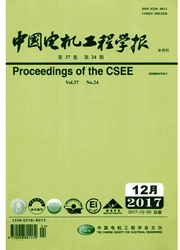

 中文摘要:
中文摘要:
利用加压热重分析仪研究加压条件下CaO碳酸化反应的动力学特性。实验研究表明,CaO最终转化率随反应总压、CO2分压的提高而增大。随着CO2分压的提高,碳酸化反应在化学反应控制阶段的反应速率明显增大。收缩核机理模型能很好地描述CaO碳酸化反应的过程。利用该模型进行动力学研究发现,随反应总压和CO2分压的提高,化学反应控制阶段的反应活化能明显降低。依据实验结果建立了综合考虑反应温度和CO2分压影响的CaO碳酸化反应速率方程,其计算结果和实验结果能较好地吻合。研究表明加压条件有利于CaO碳酸化反应的进行,所得结果可以用于近零排放制氢系统和电厂烟气CO2捕获等反应过程的模拟。
 英文摘要:
英文摘要:
Kinetics of CaO carbonation reaction under pressurized conditions were studied using a Thermax 500 Pressurized Thermogravimetric Analyzer. Experiment research shows that the ultimate conversion of CaO increases with increasing total pressure and CO2 partial pressure. Reaction rate of carbonation at the chemical reaction control stage is enhanced by elevated CO2 partial pressure. The shrinking core model can characterize carbonation reaction correctly. Based on the kinetics analysis using this model, it's proved that activation energy at the chemical reaction control stage reduces obviously with increasing total pressure and CO2 partial pressure. A reaction rate equation considering the effects of reaction temperature and CO2 partial pressure is proposed and fits the experiment data well. It is concluded that pressurized conditions are favorable for CaO carbonation reaction. The results can be used for process simulating of near zero emissions and power plant flue gas CO2 capture systems.
 同期刊论文项目
同期刊论文项目
 同项目期刊论文
同项目期刊论文
 期刊信息
期刊信息
